-
7:00pm EST
ND
PITT0
0 -
9:00pm EST
W.Virginia
Kansas St0
0 -
Final
Wichita St
Illinois St68
67 -
Final
Marist
Rider63
67 -
Final
GreenBay
Ytown71
54 -
Final
Milwaukee
Cleveland67
88 -
Final
Ohio St
Wisconsin49
71 -
Final
Louisville
S. Florida59
41 -
Final
Arizona
Utah68
64 -
Final
Penn St.
Michigan71
79 -
Final
Miami
Clemson45
43
NFL owners wonder if commish shouldn't oversee discipline
- Updated: September 4, 2015
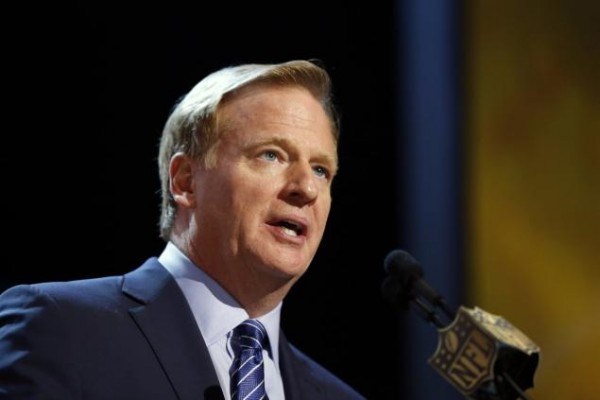 Charles Rex Arbogast/AP
Charles Rex Arbogast/APIt might not be in NFL owners’ best interests for Roger Goodell and future commissioners to remain the league’s judge, jury and executioner.
NFL owners, battered after their stunning Deflategate legal defeat, will begin the 2015 season by taking a long, hard look at how the league will discipline players in the future.
The NFL’s collective-bargaining agreement with the Players Association, which expires in 2020, gives commissioner Roger Goodell broad authority to discipline players accused of criminal or unethical behavior. But after a string of defeats that includes U.S. District Judge Richard Berman’s decision to toss Tom Brady’s four-game suspension, some owners are questioning if it is still in their interests for Goodell — as well as future commissioners — to remain the league’s judge, jury and executioner.
It may be time for the NFL to appoint an independent arbitrator to oversee discipline instead of the commissioner, some owners are openly suggesting.
“It’s not healthy for the NFL to be in the kind of litigious position that it’s been for last several years,” Falcons owner Arthur Blank told the Atlanta Journal-Constitution Thursday. “I think that the commissioner is working hard to hold up the respect and integrity of the game, the competitive balance of the game and the shield. Having said that, I think we have to find ways to get to a better place sooner with the NFLPA than the process that we’ve gone through.”
Patriots president Jonathan Kraft also said last month during an interview with a Boston radio station that the league should re-evaluate the disciplinary process: “There probably needs to be a rethinking so that the league office and the commissioner aren’t put in a spotlight that detracts from the league’s image and the game.”
Kraft, the son of New England owner Robert Kraft, had good reason to question the NFL disciplinary process — if Berman had not overturn Brady’s ban, the Patriots could have started the first four games of the season without their star quarterback. But when 49ers chief executive officer Jed York retweeted a Kraft’s statement a few days later, NFL observers saw it as yet another call for change.
Pittsburgh sports law attorney Jay Reisinger, who has represented numerous NFL players in arbitration cases, said mounting legal bills and a steady stream of bad press have driven the owners to consider a new approach to discipline.
An independent arbitrator familiar with the CBA, case law and previous cases — like those already employed by Major League Baseball, the NBA and the NHL — would apply consistent discipline. That means the fewer court challenges and fewer legal bills, Reisinger said. It would also spare the league the kind of public outrage embarrassment it suffered last year when Goodell suspended Ray Rice just two games for slugging his now-wife.
“Two things the owners respond to are money and publicity,” Reisinger said. “The 32 owners, they are the guys footing the legal bills and they are reacting to the public reaction.”
The Players Association agreed to Article 46 — the portion of the collective-bargaining agreement that grants the commissioner the authority to oversee discipline — in 2011, but union officials have indicated that they won’t be so amenable when the contract expires five years from now. Bengals lineman Eric Winston, the NFLPA’s president, said earlier this summer that he can’t see the players agreeing to another deal in the future that does not rein in the commissioner’s authority.
“This whole ordeal has highlighted the need for players and owners to work together to make all policies fair and transparent for everyone in our game,” Winston said Thursday. “I welcome an opportunity to have open and constructive dialogue with the league in the near future for how we can best accomplish that.”
Reisinger said it is unlikely that the NFL owners would agree to open the collective-bargaining agreement before 2020 to renegotiate Article 46. Even in good times, they would want concessions from the Players Association in exchange for an independent arbitrator. But after stinging defeats in the Brady, Rice, Adrian Peterson, Greg Hardy and Bountygate cases, the NFL would not have much negotiating leverage.
Reisinger said Goodell and the NFL could take steps to fix their broken discipline process independent of the union; Goodell could remove himself from the process by appointing a permanent arbitrator, for example, to hear future cases.
But NFLPA spokesman George Atallah told the Daily News the union has to be involved in any changes that affect the discipline of its members.
“Anything that is opened or implemented unilaterally at this point is not going to fly with the players,” he said.
Blank and other owners believe the NFL’s current disciplinary system is unsustainable; the only question now appears to how change will come. Union chief DeMaurice Smith hopes the changes come through dialogue rather than court challenges.
“This court’s decision to overturn the NFL Commissioner again should signal to every NFL owner that collective bargaining is better than legal losses,” Smith said “Collective bargaining is a much better process that will lead to far better results.”

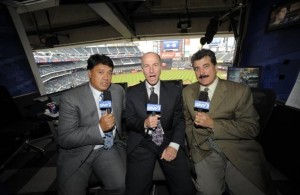
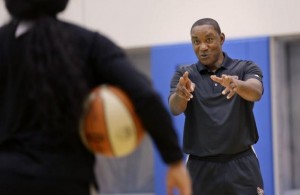
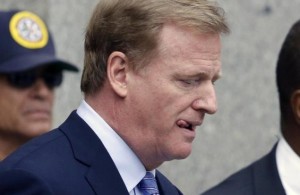




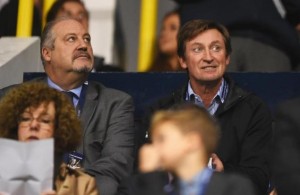
 Saving...
Saving...